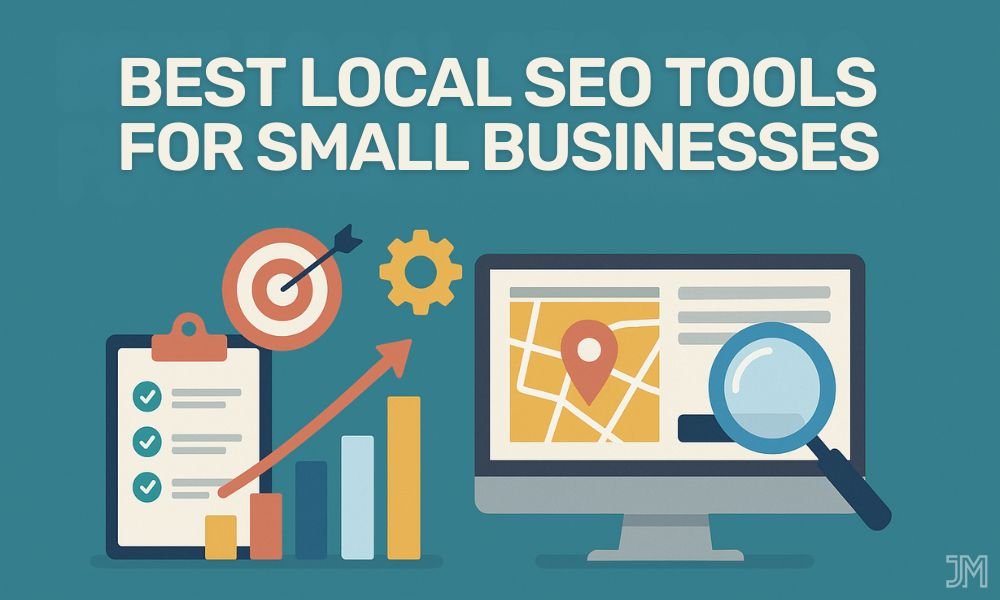
If you’re running a small business in 2025, chances are you’ve already heard how important local SEO is—but knowing where to start (or what tools are actually worth your time) is a whole different story.
Between juggling daily operations, responding to customers, and managing your online presence, learning the technical side of SEO can quickly drop to the bottom of your list.
That’s where the right tools come in. Local SEO tools help you automate repetitive tasks, uncover ranking opportunities, manage your business listings, and monitor performance without needing a full-time marketing team. But with so many options out there, it’s tough to know what’s essential and what’s just noise.
Whether you’re a brick-and-mortar shop trying to show up in Google Maps or a service-area business looking to dominate your ZIP code, these tools can help you get found faster.
What are local SEO tools & why do they matter?
Local SEO tools are software platforms or web-based services that help small businesses improve how they show up in local search results—think Google Maps, “near me” search results, or city-specific keyword searches. These tools don’t just save time—they give you the data, structure, and automation you need to actually move the needle.
If you’re trying to rank for searches like “coffee shop in Atlanta” or “plumber near me”, you’re competing in a different arena than national brands. Google looks at a unique set of signals to decide which businesses show up in local search results: business listings, reviews, location relevance, proximity, citations, on-page content, and more.
And that’s exactly what local SEO tools help with.
Here’s what the right toolset can do for you:
Make sure your business info is accurate and consistent across all major directories
Track keyword rankings by city or ZIP code instead of just national search terms
Manage and respond to reviews in one place
Optimize your Google Business Profile (GBP) to improve visibility in map results
Discover keyword opportunities that reflect real search behavior in your area
Audit your site for issues that could hurt rankings—like broken links or slow page speed
If you’re managing everything manually or relying on guesswork, you’re not just wasting time—you’re missing out on traffic that could be converting into leads or foot traffic.
Throughout this post, I’ll break down the types of tools that actually make a difference—and show you where they can save you time, simplify your workflow, and help you get real results with less guesswork.
Managing your Google Business Profile
Your Google Business Profile (GBP) is basically your digital storefront. It’s what shows up when someone searches for your business name, or when they type in something like “best [service] near me.” It’s the profile that appears in the local map pack, on the right side of Google search results, and in Google Maps. In short: it matters.
But here’s where many businesses fall short: they create a profile, fill in the basics, and never touch it again.
There are tools that make GBP optimization easier—especially if you’re managing multiple locations or want help scheduling posts and pulling performance data. Whether you’re doing this manually or using software, the important thing is consistency. The more useful your profile is to potential customers, the more likely Google is to show it in search.
Google Business Profile Manager (Free)
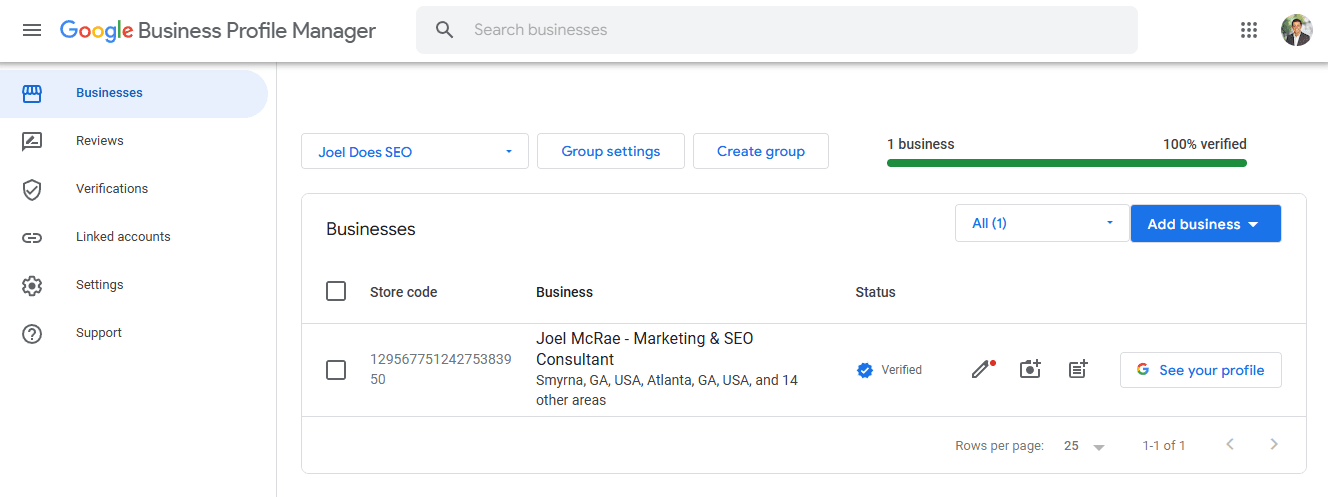
This is the built-in dashboard from Google. It’s where you claim and verify your listing, update info, respond to reviews, add photos, post updates, and monitor insights like views and clicks.
The best part? It’s completely free.
Google Business scheduling & reporting tools
Posting updates, responding to reviews, uploading photos, and monitoring insights manually can get tedious, fast. That’s where GBP management tools come in. These tools let you schedule posts ahead of time, track your local rankings, monitor competitor profiles, and pull performance reports that show how your GBP is actually contributing to your growth.
For small businesses, using a good GBP management tool can turn something that feels like busywork into a streamlined, once-a-week task.
Local Viking – Helpful for scheduling GBP posts, tracking rankings in different parts of your city (geo-grids), and managing Q&A. Best if you’re working across several areas or zip codes.
Local Falcon – A visual rank tracking tool that shows how your GBP performs geographically using heat maps. Great for spotting visibility gaps and monitoring changes after optimizations.
PlePer (Free Chrome Extension) – Allows you to spy on competitors’ categories and business details. Quick way to see what’s working for other top-ranking profiles in your niche.
Keyword & content tools for local SEO
If citations and listings build your online foundation, content and keywords are what pull people into your world. Whether it’s a service page, a blog post, or even just the text on your homepage, your words are what tell Google—and your potential customers—what you do and where you do it.
The challenge most small businesses face? They either guess at what people are searching for or they stuff keywords into their site in ways that sound unnatural. Neither approach works in 2025.
The goal isn’t just to use the right words. It’s to use the words your customers are actually typing into Google—in a way that feels natural, helpful, and trustworthy.
That’s where good keyword research and content tools come in.
Why keyword research still matters (even for local businesses)
You might think everyone’s searching for “plumber near me” or “realtor in Atlanta,” but what they’re actually searching for can get surprisingly specific.
Examples:
“emergency plumber open now in Decatur”
“best brunch spots near Piedmont Park”
“affordable divorce attorney Midtown Atlanta”
These longer, more detailed phrases (called long-tail keywords) are often easier to rank for, and they bring in higher-intent traffic. The people typing them are closer to taking action.
Good keyword tools help you uncover these opportunities—and good content tools help you turn them into blog posts, service pages, FAQs, or product descriptions that drive local traffic.
Tools that help with local keyword and content strategy
Here are some of the best tools for small businesses looking to dial in their local keyword and content game:
Semrush Local
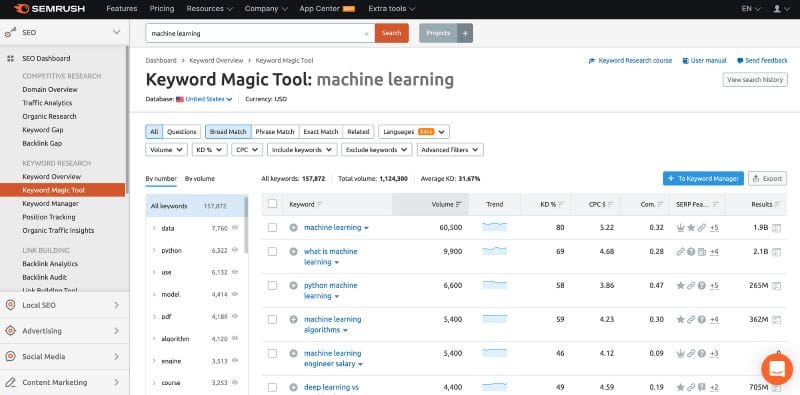
Semrush is a powerhouse for SEO research, and their local keyword capabilities have gotten even stronger. You can enter a broad term like “roof repair” and drill down into geo-specific searches like “roof repair Smyrna GA” or “best roofers near me.”
Great for finding long-tail keyword variations and local search volume
Lets you see what competitors are ranking for in your area
Includes a Keyword Magic Tool that makes expanding your blog and service page ideas easy
Also ties into Semrush Local for listing management and reputation monitoring (if you want everything in one dashboard)
Ubersuggest
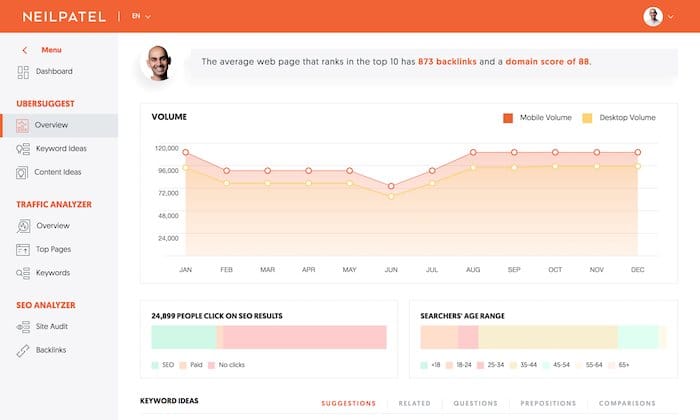
If you want something a little simpler (and budget-friendly), Ubersuggest is a solid choice. Created by Neil Patel, it offers easy keyword suggestions, competition analysis, and even content ideas—all in a much more user-friendly interface.
Good for small businesses just getting into SEO
Shows estimated search volume and SEO difficulty for local keywords
Offers content topic suggestions based on real search behavior
Also includes basic site audits and backlink tracking
Ubersuggest is great if you want a no-frills tool that gives you just enough data to make smarter content choices without feeling overwhelmed.
Keywords Everywhere

Sometimes you just want quick, real-time keyword insights without opening a full SEO tool. That’s where Keywords Everywhere shines.
Chrome extension that shows keyword data while you browse Google
Adds search volume, competition, and related keywords right into your browser
Lets you see what people are searching without having to leave your workflow
This is perfect for brainstorming blog post ideas, service page headings, or even new FAQs based on real search trends—without the need to open a separate dashboard.
Citation management & listings tools
Citations might not sound exciting, but they’re one of the most important building blocks of local SEO—especially for small businesses trying to rank in a specific area. A citation is simply a mention of your business name, address, and phone number (NAP) on another website. These include directories like Yelp, online maps, industry-specific platforms, and even local chambers of commerce.
Why do they matter? Because Google uses them to confirm that your business is legit, local, and active. If your info is inconsistent—or missing from key directories—you’re basically sending Google mixed signals. That can hurt your visibility in local search and maps results.
What good citation tools do:
Help you build new listings on reputable sites
Keep your business info consistent across dozens of platforms
Identify duplicate or outdated listings
Sync your NAP across networks automatically or through guided steps
Alert you when your info changes or gets flagged
For small businesses, using a citation tool can save you hours of manual work—and prevent a bunch of errors that could cost you rankings down the line. Even if you only manage one location, it’s worth getting this part right from the beginning.
Tools that help you manage citations
Here are some of the most effective tools that help you build, monitor, and clean up local citations—without spending your weekends chasing down outdated listings.
Semrush Local
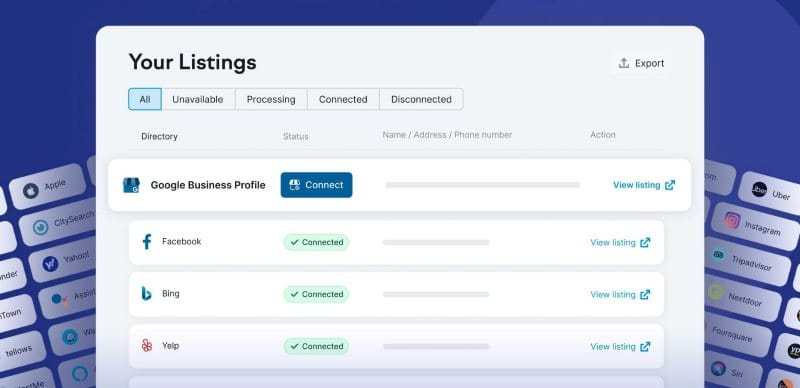
🚀 Semrush Local is a great choice if you’re already using Semrush for keyword research or technical SEO—and you want your local SEO work tied into one simple dashboard. It’s especially helpful for small businesses that are starting to invest more seriously in tracking their visibility and online reputation.
While all the following platforms are great for local citation management, Semrush is by far my favorite SEO tool across the board.
- Syncs your business information across dozens of major directories, including Google, Apple Maps, Bing, Yelp, and more
- Alerts you to duplicate or inconsistent listings so you can fix problems fast
- Includes review management tools so you can monitor and respond to customer feedback in one place
- Offers local rank tracking to show how your business performs in different cities, neighborhoods, or zip codes
Semrush Local is part of the larger Semrush SEO platform and offers powerful local listing management for businesses that want more than just basic directory coverage. It combines citation building with ongoing monitoring, reputation management, and even local SEO reporting.
BrightLocal
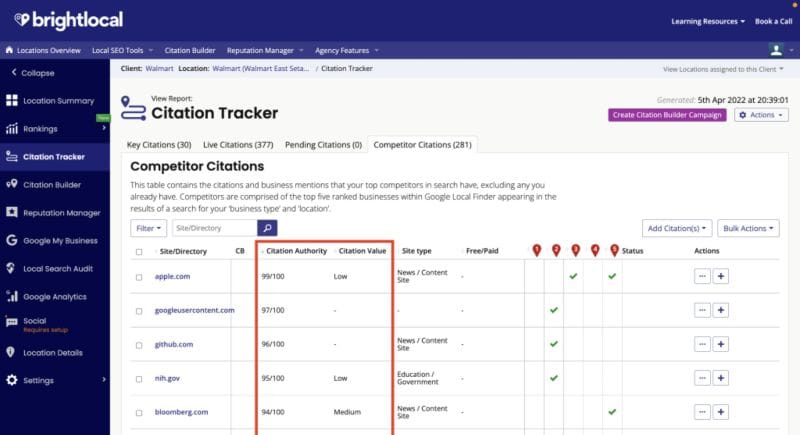
BrightLocal is an all-in-one local SEO tool built specifically for small businesses and agencies. Its Citation Builder feature lets you manually submit to dozens of top directories, while the Citation Tracker helps you spot missing or inconsistent listings.
- Great for businesses that want a clear report of where they’re listed—and where they’re not
- Offers both DIY and done-for-you submission options
- One-time fee per citation campaign (no recurring cost unless you want it)
- Bonus: It also includes review tracking and local rank tracking, so you’re not juggling multiple tools
Yext
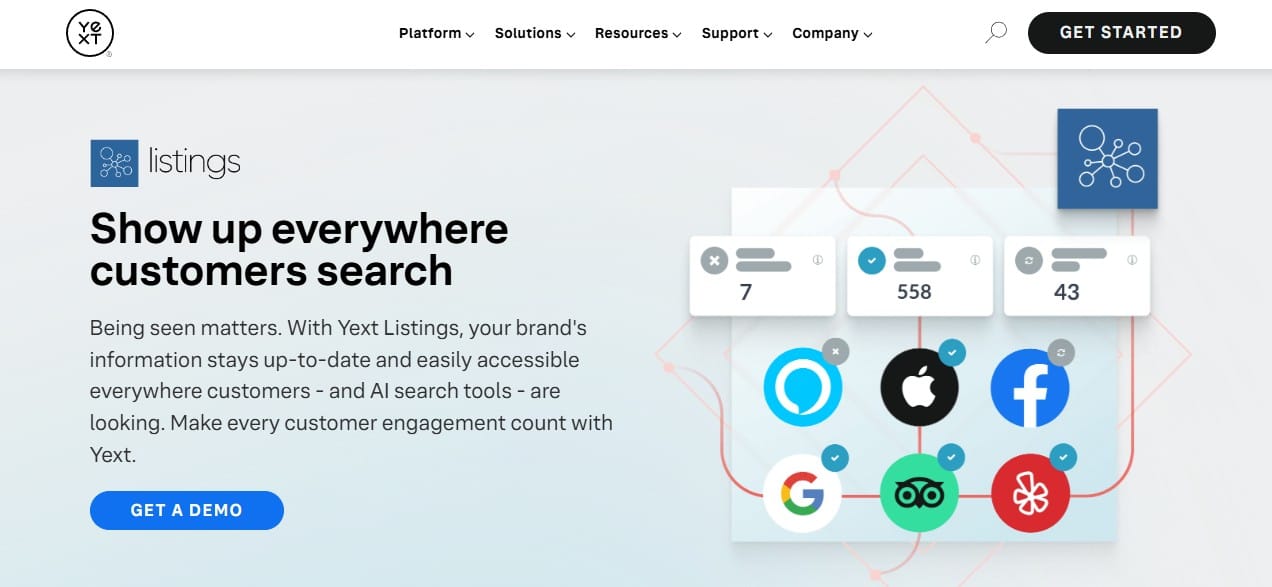
Yext takes a slightly different approach—it acts like a hub that syncs your business info across a huge network of directories. Instead of submitting manually, it pushes your updated info in real-time to partner platforms.
- Ideal for businesses that want total control and real-time updates
- Offers automated syncing with platforms like Google, Bing, Apple Maps, Yahoo, and dozens more
- Particularly helpful if you change phone numbers, move locations, or rebrand frequently
Yext operates on a subscription model, which makes it a better fit for businesses that want to “set it and forget it” rather than manage listings manually. I’m also an affiliate partner here and trust Yext for businesses that need scale and speed.
What to watch out for
Don’t pay for shady “listing blast” services that promise 1,000+ directories. Most of those links are low-quality and won’t help you rank.
Avoid duplicate listings by searching your business name + phone number and checking platforms manually before creating a new profile.
Revisit your listings every 4–6 months, especially if your business details change.
Citations may seem like a small part of your local SEO plan—but they set the foundation. If search engines can’t verify your basic business info across the web, your rankings (and your credibility) take a hit. Get your listings in order early, keep them consistent, and use a tool that fits your needs and budget.
Whether you go with manual submissions or a more automated system, citation management is one of the highest-ROI steps you can take in building a stronger local presence.
Technical & website tools
Local SEO isn’t just about business listings and keywords. The technical health of your website matters too. If your site is slow, hard to navigate, or difficult for search engines to crawl, it can drag down your rankings—no matter how strong your content or citations are.
The good news? You don’t need to be a developer to stay on top of the basics. A few good tools can help you spot problems early and keep your site running fast, clean, and search-friendly.
✅ Google Search Console (Free)
Google Search Console gives you direct insight into how Google sees your site. You can monitor keyword rankings, spot technical errors, submit updated sitemaps, and see which pages are getting clicks and impressions.
Track performance for local keywords
Identify crawl errors or mobile usability issues
Monitor backlinks pointing to your site
If you’re serious about SEO, setting up Search Console is non-negotiable.
✅ Google PageSpeed Insights (Free)
Page speed affects both user experience and SEO. Google PageSpeed Insights tests how quickly your site loads and highlights issues that slow you down—like oversized images, unnecessary code, or server issues.
Provides separate scores for mobile and desktop
Recommends specific fixes you (or your web developer) can make
Flags major issues that could affect Core Web Vitals
A faster site keeps visitors from bouncing and signals to Google that your site is user-friendly.
✅ Screaming Frog SEO Spider (Lite Version Free)
Screaming Frog is a website crawler that scans your site like a search engine would. Even the free version is powerful for small websites.
Finds broken links, duplicate pages, missing title tags, and metadata issues
Audits site structure to make sure important pages are linked properly
Identifies thin content pages that might need improvement
If your site has more than 500 URLs, you’ll need the paid version, but for many small business sites, the free version covers the essentials.
✅ GTmetrix (Free and Paid Versions)
GTmetrix is another excellent tool for testing website speed and performance. It breaks down exactly where your site slows down and gives a simple, easy-to-understand performance score.
Provides a detailed waterfall report of load times
Identifies heavy images, bad scripts, and hosting issues
Tracks performance over time if you set up a free account
Paired with Google PageSpeed Insights, GTmetrix helps you get a complete picture of your site’s loading health.
How to choose the right tools for your business
With so many local SEO tools out there, it’s easy to overcomplicate things. But here’s the truth: you don’t need everything. The best setup is one that fits your goals, your budget, and how hands-on you want to be.
Ask yourself these 3 questions:
1. What’s my biggest local SEO need right now?
Are you struggling to show up in local searches at all? Start with listings and citation tools.
Already ranking but not getting traffic? Focus on content and keyword research.
Getting traffic but not converting? You may need site speed or review tools.
2. Do I want to manage things manually or automate them?
Some business owners like having full control—submitting their listings manually, writing content, checking Google Search Console themselves.
Others would rather automate updates, schedule posts in advance, or get alerts when something needs attention.
Pick tools that match your comfort level.
3. What’s my budget?
Many tools offer free versions or trial periods. Don’t overcommit to something expensive unless it clearly saves you time or drives results.
Start small—add more tools as your needs grow or as results start rolling in.
Final takeaway: Start simple, stay consistent
Local SEO doesn’t have to be overwhelming, and you don’t need to be an expert to make real progress. With just a few smart tools in your corner, you can manage your listings, write content that gets found, monitor your visibility, and build trust with both Google and your community.
The key isn’t doing everything at once—it’s starting where it matters most for your business. Whether that’s fixing your directory listings, writing blog posts that answer local questions, or finally getting your Google Business Profile in shape, you don’t need to be perfect to see results. You just need to be consistent.
And if a tool helps you move faster, stay organized, or avoid guessing? That’s time and energy well spent.
Let’s grow your traffic together
Have an SEO question or need help with a project? Whether you’re a small business or a national brand, I’ll help you rank higher and convert more.
